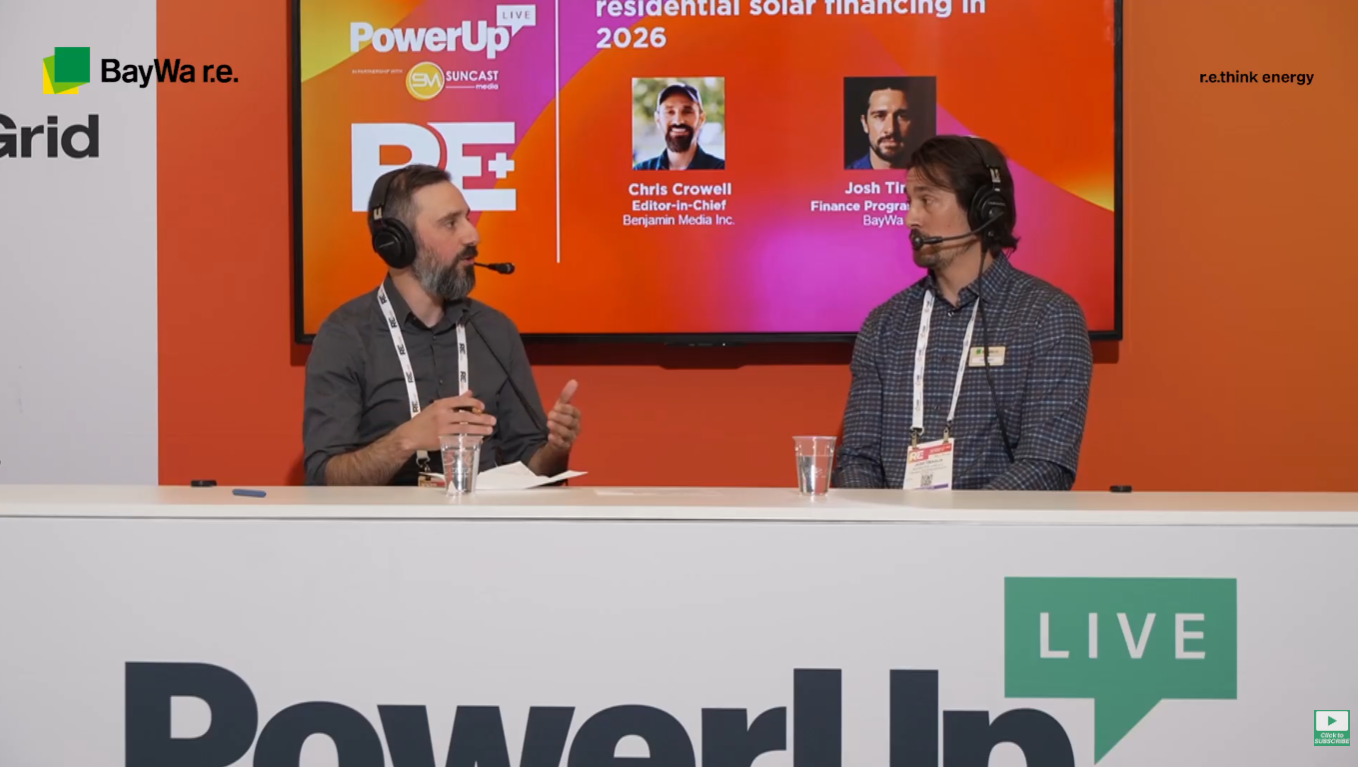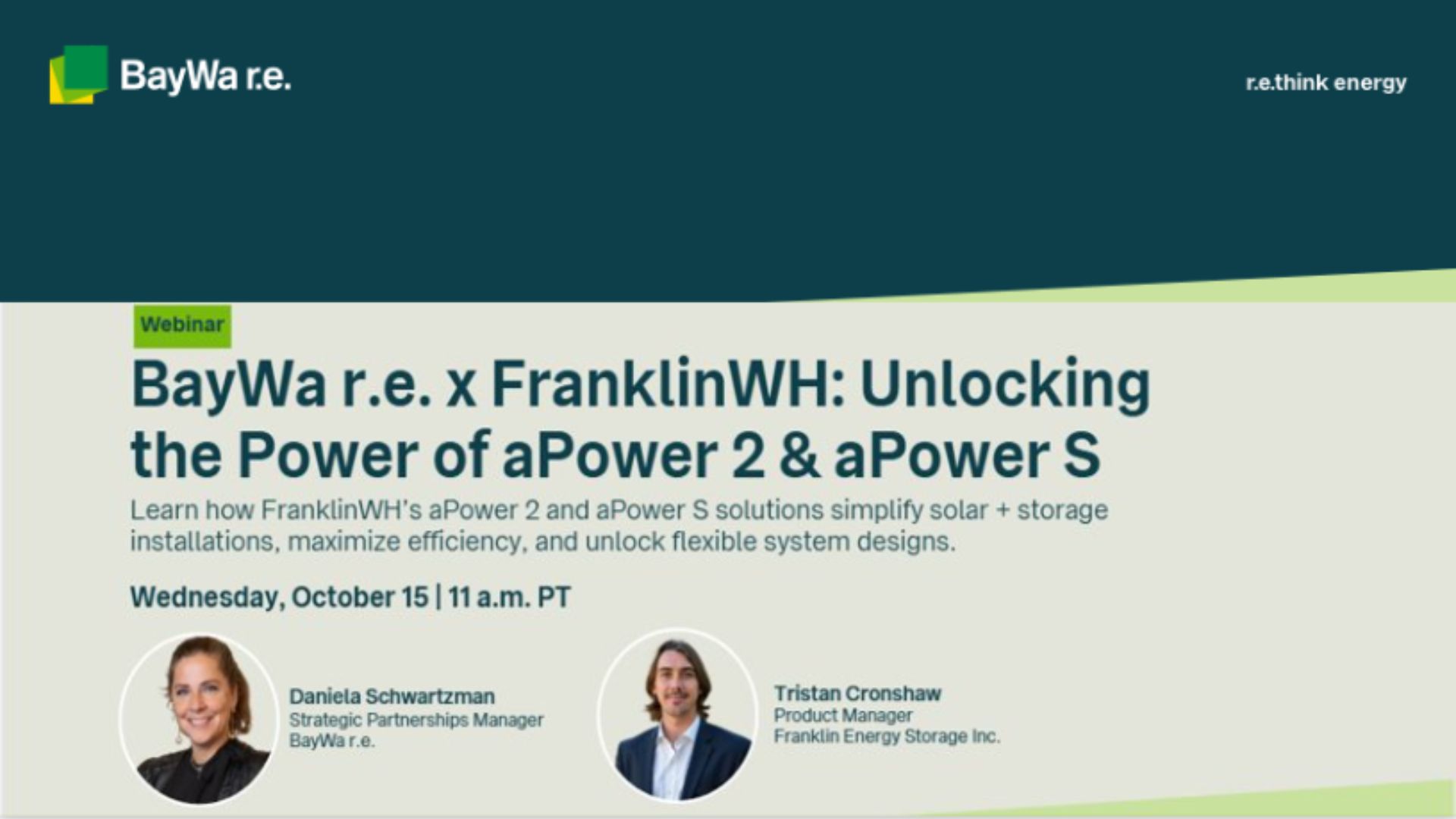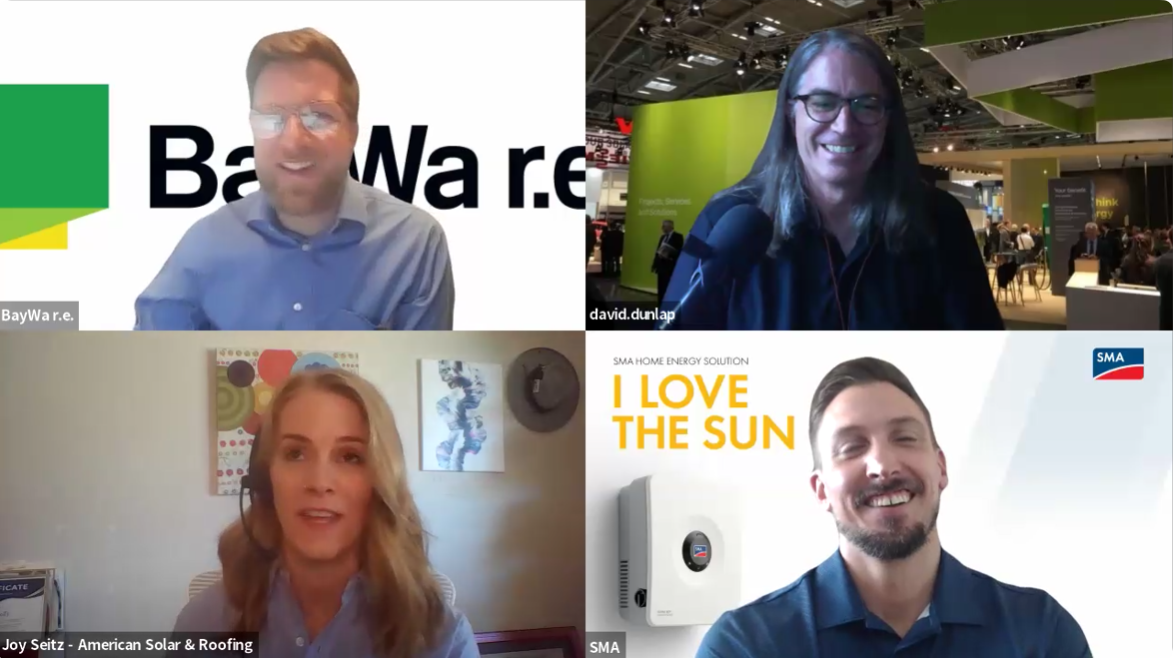Welcoming a child into the world is an important event for any family. However, setting a generous leave policy for your business may feel daunting.
In this installment of our Culture Chronicles solar business series, we want to dispel some of the myths surrounding paid family leave — and discuss how to create an equitable and welcoming company culture with supportive leave policies.
Whether or not you work in the solar industry, we want to share some lessons learned at BayWa r.e. from implementing our family leave and paid time off (PTO) policies. We’ll hear from both management and employee perspectives in this podcast, with insights and experiences of our Chief Financial Officer Jodi White; our Strategy Manager in People Experience Krysta Riggle; and our regional team members Tyger Brown and Clark Galloway.
Family leave matters — and permission and encouragement to take family leave creates trust between business leaders and their employees and among team members of a department as well. It’s a heartfelt conversation that solar entrepreneurs won’t want to miss. Watch or listen to our full conversation or catch the podcast summary below. Thanks for listening!
Podcast Summary:
The People Experience (PX) philosophy: “People Experience goes beyond the traditional HR aspects to really think about what the employee’s experience is in working within our company. We look at the employee life cycle and making sure that we’re upholding our values kind of at each stage — and that our core values are alive and well in our employees. We at BayWa r.e. Solar Systems are truly deliberate about our culture: we create and view culture as the backbone or foundation of the work that we’re able to do as an organization.”
BayWa r.e. Solar Systems’ own family leave policy: “Our family leave policy is 12 weeks of paid leave. This is for employees becoming parents or need to take care of a sick family member. In terms of becoming parents, it could be through having a child through adoption, surrogacy — whatever path that somebody takes to become a parent. It also applies to both dads and moms; we’re trying to be as equitable as possible and create space for both parental and maternity leave when it comes to comes to our policy. All employees are\e also able to take an additional nine months of unpaid leave if they decide to do that — and then still have a job when they come back. Really, it’s about making sure employees have space to be healthy and make the best decisions for them, as they’re entering this new time in their lives and counting on their organization for that support.”
Why it’s never too late or too early to establish your company’s family leave policy: “BayWa r.e. Solar Systems didn’t have a policy for a while, to be honest — until we had BayWa babies coming into the fold. And when we did, we realized that we needed policies to support new parents, especially thinking about health being one of our core values. That inspired us to make this change and offer these benefits, granting employees the physical and emotional space to have their children, to recover from birth or adoption, and be able to connect with their children without the immediate stressors of figuring out childcare. Financial health as well, being able to support our employees during that time and not forcing them to take it as unpaid.”
Why good family leave policies make business sense: “Employees are going to stay longer with your company when they feel supported. That’s the long-term benefit. Think about how often in our industry how little we actually talk to each other about what’s happening outside our lives, and the unwillingness of organizations to actually engage with an employee becoming a parent. By creating spaces where we can talk to our employees about preparing for parental leave, what it might be like to come back, and having honest conversations — that creates a trust that is long-lasting between the employee and employer.”
A feeling of comfort: “I was fairly new at BayWa r.e. Solar Systems, and still learning my role, when I learned that I was pregnant. I wasn’t fully sure what the policy was, so I was nervous about how I would relay my news. But it was really comforting to know that we had a policy in place that would protect my role — so I have a job to come back to — but also that the company was supportive of me preparing for my leave. My fellow team members helped me put things in place so that they could fill in for me while I was away. I didn’t have to stress about how much time I had accrued in terms of paid time off — I could just take that time away and focus on my baby and the stress of being a new parent. I was very grateful for that.”
Set the tone early in an employee’s onboarding: “In our hiring process, I try make a point that family leave is one of our benefits just from the get-go, for anybody who joins the company. Even still, I think there’s still a little bit of a fear element for people even if they know that piece. So, when somebody announces their life news, I reiterate my official PX stance: that they are encouraged to take the full 12 weeks — don’t be scared to take advantage of this benefit. Because some employees might second-guess the policy and think, ‘How are people gonna look at me if I take the full 12 weeks? Is that really what people do, or is that just kind of what the company says?” So, you really have to re-establish that trust early — our expectation is that you take 12 weeks – or whatever you feel is healthiest for you and your family.”
Setting family-friendly culture means delivering seamless experience for customers: “From a business perspective, being open about family leave means we have a much longer runway to plan. How are we going to support this person’s role while they’re out? What changes do we need to make? How do we cross-train other people so that they can take on more work? How do we make sure that our customers don’t feel a difference when they’re handed off to someone new? We’ve been able to do all this very deliberately at BayWa r.e. Solar Systems.”
A fatherhood perspective: “There was a weird, unwarranted guilt of taking that time off as a father. But Krysta and our company encouraged me and said, ‘Let’s just do the full 12 weeks. You deserve it and you’re going to need it.’ So, I am very glad that I did take that full time off — especially when other men tell of stories like, ‘You know, back when [I had a kid] I was back in the office the next day. But maybe I did miss a lot not being with my family in those first few weeks.’ You just don’t hear that often of fathers being able to take that time off — and I appreciate what a unique culture we have at BayWa r.e. Solar Systems and how lucky we are to embrace it.”
Supporting colleagues also opens opportunities for upskilling: “Being deliberate about the work that I’m passing off to my colleagues – and creating these growth opportunities for her — she’ll be pushed into new experiences while our company keeps up our standards. I’m excited to see how she develops and [what] workflow I come back to. Just feeling open-minded about these transitions — what do we need to do within this department; how do we need to build that out; how do we maintain those expectations — that’s been liberating and gives us the flexibility to see how everyone can get involved.”
“Onboarding” employees when they return from leave: “From a tactical perspective, planning is really crucial. And I think preparing for their return is a lesson that we’ve learned, because it’s easy to think that, ‘OK, this person is going to come back and they’re just going to pick up their job where they left off, and their tasks will shift back like they were before.’ But things change and processes change, and maybe the company has found more efficient ways of doing things. So, team leaders and department leaders should really think about what happens when this employee comes back. It’s almost like onboarding somebody again.”
Considering Unlimited PTO (Paid Time Off) as a PX policy: “BayWa r.e. Solar Systems offers unlimited PTO, which helps to create flexibility for folks so they’re not worried about taking an afternoon off to do an activity with their kids, go to their game, pick them up from school, or whatever — without having that time accrued and punch out and punch back in. Our baseline expectation is that people are doing the work that they need to do within their role and also taking care of themselves and being healthy — and that extends to their family.
Adapting your policies to changing circumstances: “With COVID, we actually extended our family leave policy so it wasn’t just for taking care of a sick family member or bringing a new child into your life. If you’re coming up empty for childcare options and you need to support your family and help your kids through whatever is going on, then parents could also take advantage of this 12 weeks of paid time off — so they could make sure that their family life was moving the best that it could. They could trust us to support them through that.”
Why family leave matters: “Family leave is actually necessary. The rest of the world is way ahead of us, and it’s critical for organizations to take this seriously for the health of their employees and their communities. And for women who don’t consider leadership roles because they want a family or any employee who would hold themselves back because they were wanting a family — that still exists in our world. That is not what we want — and I want to work on kind of breaking down those societal norms.”
The memories you get to keep: “The timing was everything for me. My son was born right at the end of May, and within a few weeks I got to celebrate my first Father’s Day with my newborn. And that just meant so much to me. We went birdwatching, we got to go out in the outdoors and enjoy the sunshine, the first time as a new family. That is something that really stood out to me — and something that I’ll never forget being a new dad.”
“With my two previous kids, I took six weeks off and I had to return. This time — just being able to see a little bit more of the milestones that children reach in their first few weeks of life — was fantastic. Being able to be there to catch the first smile… those are sometimes things that you miss because you’re back to work and you don’t know when those things will take place. It’s comforting to just have the time to be there as your full self and just enjoy your baby. I’m so grateful for that.”

BayWa r.e. Solar Distribution supplies residential and commercial solar installers in the United States with quality solar + storage components, forecasting, business planning advice, and a community of experts. Visit www.solar-distribution.com to engage with our team, read our industry insights articles, and stream our Solar Tech Talk podcasts and recorded webinars on YouTube and Spotify. Follow us on LinkedIn and Facebook to stay connected. Ask us about our Financing Program and use our industry-leading Webstore to save time, get gear shipped, and get jobs done!
Part of the BayWa r.e. Global family of renewable energy companies.




